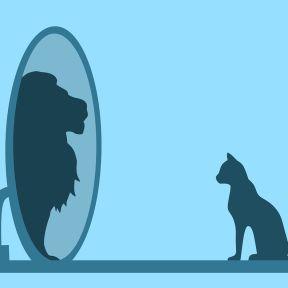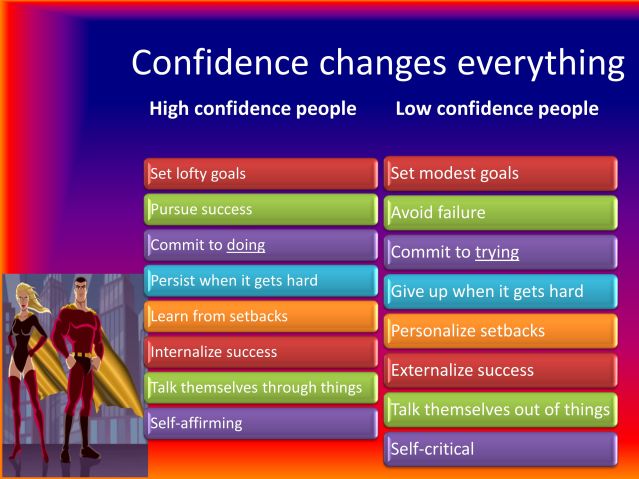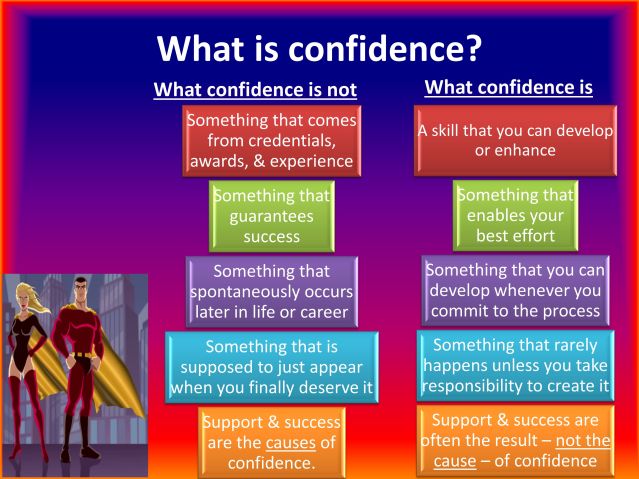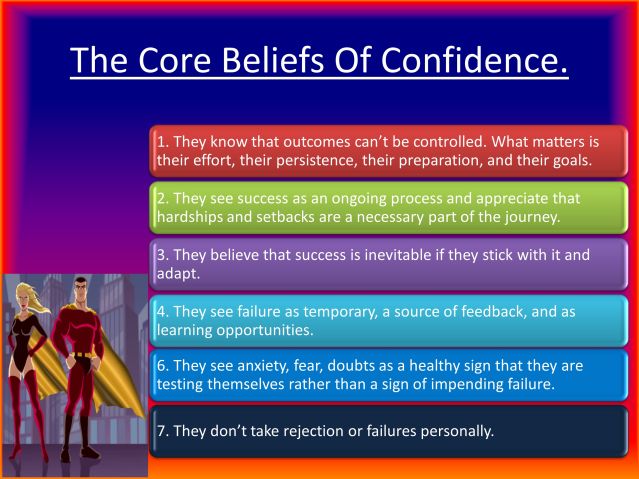CONFIDENCE- The Core Beliefs of Confidence. Changes in thinking, not outer circumstances, are the key to confidence. Reviewed by Tyler Woods

KEY POINTS-
- Confidence is one of the few qualities everyone wants more of.
- Many myths about confidence actually prevent us from becoming more confident.
- Confident people have distinct core beliefs that less confident people lack.
- A person can improve confidence by adopting the core beliefs of confident people.
In a world where consensus and shared values are increasingly hard to find, the desire for greater confidence is a rare unifier among otherwise divided Americans. Take any two Americans—no matter how different they may appear demographically, politically, or socio-culturally—and you can be almost certain that both wish they were more confident.
Why do people universally crave confidence, arguably even more than they desire money, mates, and material success? Because (see Figure 1 below), confidence is one of perhaps just two experiences in life (love being the second) that change all the other things in life for the better. If you don't believe me, just look at the confidence research. The latter demonstrates, for example, that people with greater confidence are rated as more attractive, adventurous and outgoing, and physically and emotionally healthier1. They enjoy more and higher-quality relationships. Confidence even makes people more resilient to stress2. Whether on our inside or outside, confidence really does seem to make everything better.

With all these benefits, it is no wonder that confidence is the rare commodity that everyone wants. The more intriguing question is why everyone doesn't already have more confidence. In this blog, I will argue that you're probably underachieving your confidence potential not because of a lack of support or external success but because of accidental ways you've learned and been taught to think. If that explanation strikes you as too simple to be true, consider the following:
- Self-limiting beliefs can make a rich person feel poor;
- A strong person feel weak;
- A beloved person feel lonely.
It turns out—left unrecognized and unaddressed—the same types of self-limiting belief patterns can also confine a potentially confident and self-actualized person to a lifetime of insecurity.
Why confidence is so elusive.
If confidence were a metaphorical wise man living atop a Himalayan mountain, we could say that most people lack confidence because they have been given bad directions. Even the most precious and sought-after treasure will likely elude us without an accurate map. What are the common "directions" we are given to climb the confidence mountain? We are taught that confidence comes from a) having successful experiences; b) achieving degrees, promotions, and related milestones; c) from obtaining experience at the thing about which we want to be confident; and from d) support and encouragement from others.
None of these are required for you to become more confident. Yet these pervasive confidence myths are told to us so many times by so many authority figures that they appear unassailable. Worse, these myths also convince us that there must be something fundamentally wrong with ourselves because even when we "win", earn credentials and awards, invest months or years of work, and receive positive feedback from others, it rarely translates into confidence. Despite ticking all the confidence boxes, we too often instead manage to still feel like a fraud, whose disguise simply hasn't yet been revealed. If you've followed the confidence formula and haven't obtained the result, perhaps the problem is with the formula, not with you.
This phenomenon—people lacking confidence despite an abundance of external indicators of skill, success, and support—is so common that it has a name: Imposter syndrome. It affects perhaps 50 percent of students in medical school and doctoral programs3 and shows us that the conventional thinking about confidence is not only flawed when it comes to improving confidence, it may even lead to lower confidence in a vicious cycle of achievement striving to mask growing insecurity. If everything you've probably been taught about confidence is untrue (see below figure), what really works?

What is confidence and how do you get it?
The path to confidence comes with good news: you don't have to be wealthy, brilliant, successful, or even experienced to get there. You can be confident right from the start, while still lacking any credentials, trophies, or fanfare. You just have to change how you think. By this, I don't mean changing how you think on the superficial, conscious level. Confidence won't come from affirmations, gratitude journals, or even meditation. The process of building confidence instead results from changing your thinking at the level of your core beliefs. By comparison, if you wanted to produce a lasting change in your behavior, it is critical to align your new behavior with your core values and goals. Without this connection to core values, behavior change lasts only as long as your willpower. The same is true for confidence.
Confident people possess distinct core beliefs that differ from the beliefs possessed by people who struggle with confidence (see figure below). And these core beliefs of confidence are more often the cause—not the result—of both the external successes and internal satisfaction that confident people achieve. It is important to highlight that even people lacking confidence can succeed. In fact, they often do. For them, however, that outer success doesn't come with the internal positive emotional experiences enjoyed by the high-confidence person. Instead of satisfaction and a sense of achievement, the person who succeeds without confidence usually just experiences relief (that they didn't mess it up). If the latter sounds familiar, take heart: This cycle can be broken and replaced with a new way of living and feeling.

If your goal is to experience the many inner and outer rewards of confidence, the above list of common core beliefs is an excellent place to start.
- To begin, put these beliefs in your own words.
- Connect them in as many ways as possible with your personal experiences and those of people close to you to demonstrate their validity beyond any shred of doubt.
- Begin integrating these core beliefs into your behavior, with the emergent goal being that your actions become a living, visible extension of the new confidence beliefs that you are practicing.
Summary
In the end, confidence isn't really a feeling. Confidence is more like a skill. And like all skills, the skill of confidence is developed through the conscious practice of effective strategies combined with a deliberate intent to improve. Put this core belief formula to work and your confidence can be measurably improved in just months, whereas years of confidence pursuits through the accumulation of awards and experience can feel fruitless.
- Questions and Answers
- Opinion
- Story/Motivational/Inspiring
- Technology
- Art
- Causes
- Crafts
- Dance
- Drinks
- Film/Movie
- Fitness
- Food
- Spellen
- Gardening
- Health
- Home
- Literature
- Music
- Networking
- Other
- Party
- Religion
- Shopping
- Sports
- Theater
- Wellness
- News
- Culture
- War machines and policy

